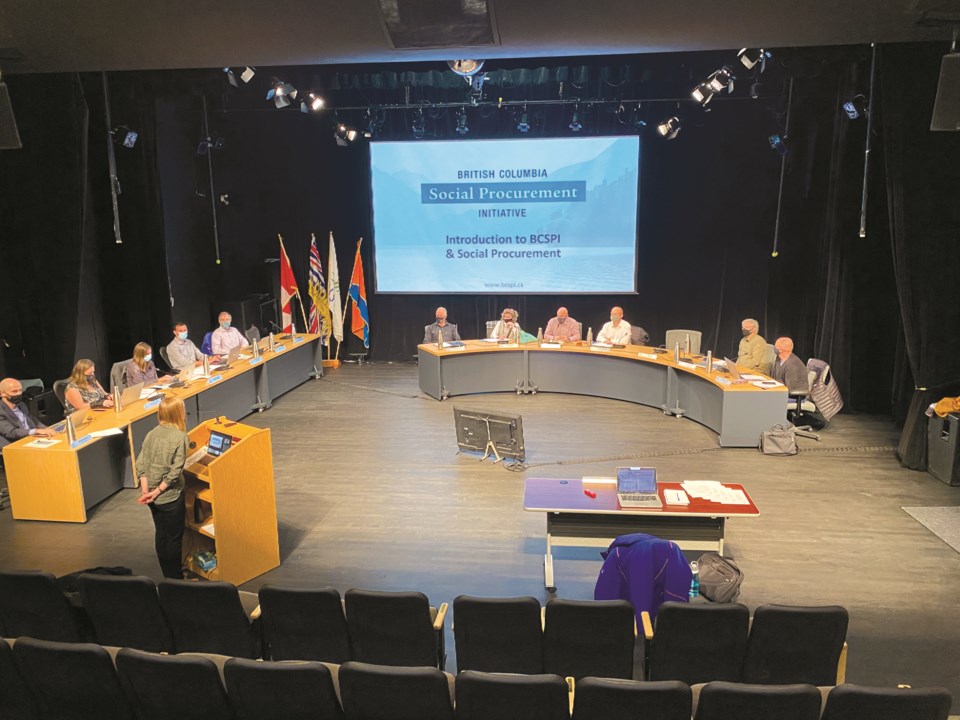A new provincial initiative aims to help municipalities get more bang for their buck.
The British Columbia Social Procurement Initiative (BCSPI), announced by the province in June, encourages local governments and organizations to pool resources, and gives them the tools and training to make smarter purchasing decisions that focus on best value rather than just the lowest price.
“Social procurement is the idea that every purchase has environmental, cultural and social impacts, whether you intend or not,” said Tori Williamson, director of education and communications with Buy Social Canada, a social enterprise with a mission to advance social procurement.
“The idea is that you’re not just going to be leveraging the economic value of your purchase, but you’re also going to be thinking about, is there other types of value that could be created that can contribute to your community and social goals?”
Every year, governments at every level spend billions on contracts and services—through the BCSPI, the idea is to add more positive intention to where the money is actually spent.
“[Governments] can think about, ‘OK, we already have strategies for our communities around things like poverty reduction, affordable housing, inequality, diversity—how can we use the money we’re already spending to achieve the goals we already have?” Williamson said.
“It makes sense across the political spectrum because you’re using the same spend to achieve more.”
There are 30 municipalities that are currently members of the BCSPI, Williamson said in a presentation to Whistler’s Committee of the Whole on Oct. 19, each of them taking different approaches to social procurement.
Members have spent more than $200 million on social procurement initiatives related to more than 50 pilot projects so far, Williamson said.
One example comes from the Comox Valley Regional District, where officials looked to install a $126-million water treatment plant while also maximizing employment, skills training and apprenticeship opportunities for local disadvantaged, equity-seeking and marginalized people.
“They were kind of curious if it was going to have additional costs on the project,” Williamson said, noting that the perception that social procurement will increase costs is a common myth.
“They found that there was no additional cost and they were actually able to get double the amount of targeted (community employment benefit) hours that they initially looked at.”
Being a member of the BCSPI includes considering your broader objectives, then identifying opportunities to “incorporate social value in your existing purchasing,” Williamson said.
“So what are services you’re procuring, what are construction projects that are coming up, how can you leverage that spend to achieve the objectives that you’ve identified?” she said.
Member municipalities also aim to incorporate “community and vendor engagement, as well as training and education, and report on metrics throughout the whole process,” she added.
The BCSPI grew out of a smaller program launched in 2016 focused on Vancouver Island and coastal communities.
On June 16, the provincial government announced a $500,000 grant to expand the program across the province.
The funding allows BCSPI members access to four partner organizations—Buy Social Canada, Presentation Plus Training and Consulting, Scale Collaborative and the Vancouver Island Construction Association—as well as lessons learned by other member municipalities.
“Everything is completely discounted—you get free training for your team, you get free consulting, [and] you get access to the member online centre,” Williamson said, adding that Whistler’s fee for the year would be about $1,500.
“The whole team is here to try and make it as easy as possible for [members]. I know that local governments are working their butts off; everybody has so much on their plate, so we want to make this as accessible and approachable as possible.”
Whistler’s mayor and council expressed interest in the concept, and a decision on whether to become a BCSPI member will come at a later date.
Find more info, including case studies from member municipalities, at bcspi.ca.




